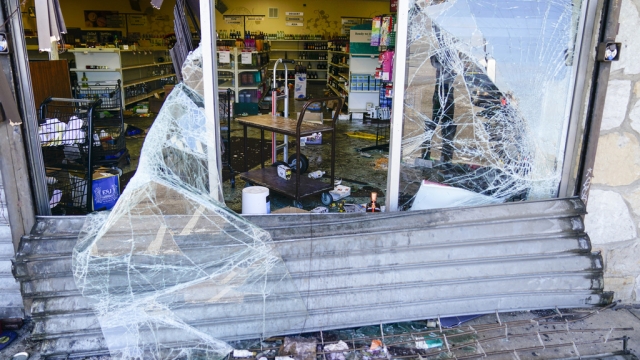Philadelphia Police have arrested at least 52 people — many of them teens — for looting several businesses Tuesday night, stretching from downtown to northeast areas of the city.
In what police say was a coordinated effort, dozens of thieves ransacked Foot Locker, Lululemon and Apple, taking thousands of dollars of merchandise and destroying property in the process. There were also seven cars stolen from a parking lot in northeast Philadelphia, though one had been recovered by Wednesday afternoon.
At least 30 of those arrested have been charged with burglary, theft and other crimes, authorities said.
"At this point, we're investigating that there was possibly a caravan of a number of different vehicles that were going from location to location," said John Stanford, interim Philadelphia Police commissioner. "Right now, we have a couple of those individuals in custody."
Police say the effort appears to have been organized on social media, as videos of the evening rapidly popped up online that night with some featuring thieves telling each other where to hit next.
Several cities are dealing with this type of flash-mob style looting.
Los Angeles County recently approved $15.6 million to curb smash-and-grab thefts and fund its newly created Organized Retail Theft Task Force.
SEE MORE: Why are retail thefts on the rise?
Target, the seventh largest retailer in the country, announced it would be closing nine stores in New York, Seattle, San Francisco and Portland, saying in a statement, "theft and organized retail crime are threatening the safety of our team and guests, and contributing to unsustainable business performance."
An National Retail Federation survey shows organized crime cost stores an average of more than $700,000 per $1 billion in sales in 2020 — up more than 50% in the last five years.
"What we're really seeing today is the large-scale organization of groups that vary in scope and scale," said David Johnston, vice president of asset protection at the National Retail Federation. "They're going and taking merchandise at mass quantities. We've seen at the recent events $300,000, $10,000."
Johnston blames the growth of the online marketplace as an option to sell stolen goods and the softening of criminal prosecutions as part of the reason for the rise in retail theft.
"If it is that opportunistic shoplifter who is stealing for need, let's get them the help that they need in order to become a better citizen," Johnston said. "But if it's those that are openly and brazenly running into locations and stealing, let's treat them [like] what they are. They're criminals."
The most recent shoplifting in Philadelphia Tuesday took place shortly after peaceful protesters took to the streets after a judge dismissed all charges against a Philadelphia police officer who shot and killed a man during a traffic stop. But police don't believe the protest and thefts were related.
"This had nothing to do with the protests," Stanford said. "What we had tonight was a bunch of criminal opportunists take advantage of a situation."
Trending stories at Scrippsnews.com



